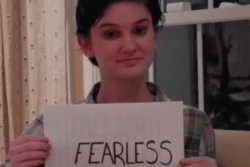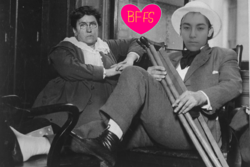On Gender Expression, Elementary School Fashion Rebellion, And Ill-Fitted Polo Shirts
It is a general truism that in a society which prioritizes one’s physical appearance over one’s personality, dressing outside of the established norm is often a form of social self-ruin. It is also a general truism that the delicate ecosystem of Jewish private school isn’t the place most conducive to experimentation with gender expression through clothing. I state these truisms with purely my own experience to back them up. Being that not ten years ago I was the archetypal “tomboy” in my small, private day school, I’d like to think I have some authority on the matter. It has taken me a good number of years to be able to objectively analyze my experiences and to recontextualize them in the larger scheme of gender norms, feminine identity, restrictive standards of beauty, and internalized sexism. I’m still in the process of unpacking these multilayered experiences, but so far it has been quite informative, to say the least.
I’d like to use my own experiences as a launchpad for a wider exploration of the social implications related to exterior appearance. Up until age 12, I straddled a blurry line between gendered social groups; my disdain for anything remotely pink or feminine alienated me from the girls in my class, yet my quasi-girlhood, the femininity that I still retained, and my reserved nature prevented me from becoming (cue Jenny Lewis) “one of the guys.” To blame the limbo-like state of my elementary school interactions solely on the clothing I wore would be irresponsible. There were a number of other factors which I won’t discuss here that contributed to my rocky social start (i.e. I was a total weirdo), but I firmly believe that the ill-fitted polo shirts and khaki pants that I insisted on wearing were a large part of it.
In a twisted way, I’d say I’m pretty lucky in that I lacked any form of self-awareness at the time; I had no idea I was being othered, so I had no reason to feel upset about it. There was a turning point around the fifth grade though that sort of brought things into focus for me. I wouldn’t call it a defining moment per se, but I would consider it a moment of clarity. I remember coming to school and realizing that I was wearing the same polo shirt as another boy in my class. This had happened before, but it had never bothered me. This time though, I felt a strange mix of embarrassment, and confusion about my embarrassment. In this moment I was hyper-aware of my physical appearance, and of the “inadequacy” of my clothing choices. Not too long after, I remember approaching my mother and asking to go shopping for “girl clothes.”
What came after this event is still something I’m trying to wrap my head around. It wasn’t sudden or dramatic, but gradually I found myself being accepted socially. Looking back at it now, it seems pretty screwed up that social acceptance came with conforming to outside standards of femininity, but it wasn’t something that I noticed as an eleven-year-old. Life continued, I made some great friends, wore many regrettable (yet inarguably feminine) outfits, and moved on.
If my eleven-year-old self caught sight of me now, I’m sure she would be horrified by her future self. To her, the choices I have made about my body and outward appearance would be disturbing because they are the antithesis of the feminine, bougie (affluent and snobbish) culture in which she so desperately tried to integrate herself. To her, my thrifted old man sweaters, mom jeans, and unshaven body hair would symbolize a social failure. After all, how can you gain respect from your peers if you aren’t bedecked in the symbols of brand-name, consumer culture?
The fact of the matter is, my current outlook is far different than the one I possessed as an eleven-year-old. With age I have come to better understand the social norms that restrict us, specifically those regarding physical appearance, and started to care a whole lot less about them. Noam Green at the age of eleven wasn’t stupid, but she didn’t have the exposure or tools to question the standards of beauty, femininity, and success that were pushed onto her. It wouldn’t be wrong to say that the choices I have made about my appearance and lifestyle are an act of rebellion against these standards, but I’d also consider them to be some of the first genuinely informed and autonomous choices I have made in my life. After all, my life is my own, as are the choices I make about my body. Anybody who dares challenge that can buzz off.
This piece was written as part of JWA’s Rising Voices Fellowship.







